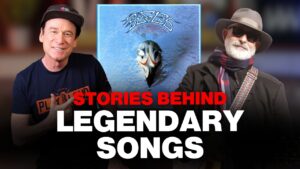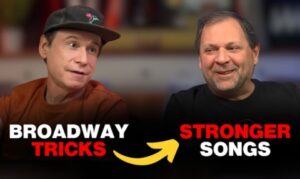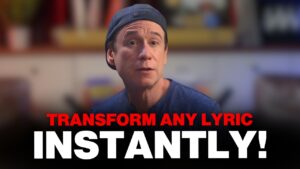Jun 23, 2025
In today’s world of songwriting “guru” templates and AI-generated music, finding your own unique songwriting voice is more important than ever if you want to succeed. In this episode, hit songwriter Clay Mills breaks down why originality is the one thing that can truly make you stand out—and how to start discovering your authentic sound as a writer.
Clay & Marty’s 10-day video series:
This video series will help you level-up your songs and finish them faster. CLICK HERE to begin!
SongTown Press Books:
Mastering Melody Writing : Check It Out
The Songwriter’s Guide To Mastering Co-Writing : Check It Out
Song Building: Mastering Lyric Writing : Check It Out

Hosts:
Clay Mills : Facebook : Instagram
Marty Dodson : Facebook : Instagram

SongTown on Songwriting Podcast
Powered by Sweetwater.com – The best place for musical gear on the planet!

For advertising opportunities
Email [email protected]
[Intro]
All right, so let’s talk about developing your own unique voice. It’s always been important for a writer or artist to break through by having their own voice— their own sound.
I mean, think about it: when I say “Adele,” she can sing just a few words and you know it’s her. Morgan Wallen? Same thing. The great singers do that. And the great songwriters do it too—by developing a unique writing style.
For me, my first big hit didn’t sound like anything on country radio at the time. It actually sounded so pop, it went Top 20 on the pop charts at the same time it hit #1 on country. That experience taught me the value of doing my own thing—not chasing trends.
[Learning From Trends Without Copying Them]
Now, I’m not saying ignore trends. You should learn from them. Ed Sheeran once did an interview where someone asked him to sing songs from the Top 10 that weren’t his, and he sang nearly all of them from memory. That’s how connected he was to current music.
[On Originality – Quotes from C.S. Lewis & “Steal Like an Artist”]
Let me share a quote from C.S. Lewis:
“No man who bothers about originality will ever be original. Whereas if you simply try to tell the truth without caring how often it has been told before, you will nine times out of ten become original without ever having noticed it.”
That quote reminds us: trying too hard to be original usually backfires. But if you tell the truth in your writing—and stay open to learning from everything around you—you become original.
In the book Steal Like an Artist, Austin Kleon says:
“Nothing comes from nowhere. All creative work builds on what came before.”
That’s a powerful truth. Originality is about remixing and reinterpreting, not inventing from thin air.
[Why Curiosity Is Key]
Here’s another thought. Research says the average adult asks only two questions a day. But kids? They’re full of curiosity. Constant “why?” and “how?” That curiosity is where creativity begins.
So I always start my melody masterclass by teaching writers how to listen—not just hear music, but really learn from it.
[Why Human Songwriters Still Matter in the Age of AI]
With AI now creating music, originality matters more than ever. AI gives us approximations—what’s already been done. But humans can go beyond that. We take in the music we grew up on, our emotions, and create something new with heart and soul.
[What Are “Hangover Notes”?]
Let me show you a technique I love: hangover notes. I heard a member of R.E.M. talk about this. It’s when you sing a note that holds over into the next chord—creating tension and emotion.
So let’s say we’re in G major and going to E minor, A minor, and D. If I sing an A note (the 2 of G) and let it hang into the E minor, it creates that stretch—this longing feeling. Instead of changing notes with every chord, you hold the note and let the harmony change underneath.
“It’s gonna take forever… to get over… you…”
By holding that note just a little longer, you create movement and emotion. That’s the beauty of a hangover note.
[Writing a Song with That Concept]
So let’s build on that:
“There’s no one else I ever felt close… to.
I know we said it was for the best…
But it’s gonna take forever… losing forever with you…”
I started with hangover notes, then followed where my heart and ear led. These techniques are launching points—not strict rules. Don’t overthink them—use them to spark something real.
[More Tools: Rubs, Suspensions, and Color Notes]
A rub is a note that clashes (in a good way) with the chord—often a half step away. Like in Lewis Capaldi’s “Someone You Loved”—that tension creates drama.
Another pro trick I learned from pianist John Jarvis: you can move from any chord to another if they share one common tone. That shared note ties them together.
[Let Your Ear and Heart Lead the Way]
Sometimes I write a melody first, then search for chord progressions that bring it to life. You don’t always have to follow the chords. Let the melody lead. Experiment.
I try to use tools like inner rhyme, alliteration—and musical ideas like hangover notes—to give my songs something special. But at some point, I stop thinking and start feeling. I let my ear and heart take over.
[Final Thoughts]
Songwriting is like cooking. We all have access to the same ingredients—but it’s how you combine them that creates something unique.
The real joy of songwriting isn’t in a polished recording—it’s in the writing itself. So keep learning. Keep experimenting. And above all, keep being you.
Be original. Not by blocking out the world—but by taking it in and responding with your own voice.
If you have questions or thoughts, feel free to reach out to me at [email protected]. Thanks for tuning in—and keep writing!
share
Write Better Songs Faster
Songwriting Success is Clay & Marty's 10-day video series that will help you level-up your songs and finish them faster. Enter your email address to get started!


